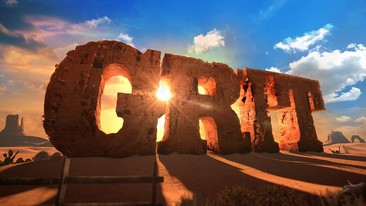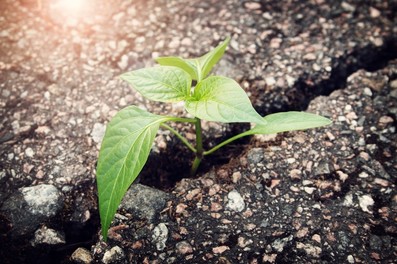 There is value in the struggle. One can only imagine the resistance Noah faced in his day. God told him to build an ark to prepare for the coming rain. “Rain? What’s that?” It had never rained before. “Build an ark? What’s an ark and who builds one in their back yard?” Imagine the ridicule and the mockery from his neighbors as they would daily hurl their contempt at him. He was the brunt of jokes. His family were the laughing stock of the town. But he never stopped building. He never stopped warning or preaching of the coming judgment. For an entire century he persisted; he labored at this work, both building the ark and calling people to repentance. But none repented, except those of his own household. It’s mental toughness at its best and perhaps there is no greater example than this Old Testament Saint. Now consider the striking contrast between Noah and another Old Testament figure, the prophet Jonah. Jonah was called by God to preach to the people of Nineveh. After a brief stint of rebellion, Jonah forced himself to walk the city preaching repentance and the coming judgment of God. Amazingly, the entire city accepted his warnings and repented in sackcloth and ashes. Here is the point: Noah preached for a hundred years and only seven people were saved. Jonah preached for one day and over a hundred thousand were saved. But which man made it into the Hebrews Hall of Fame? Noah! Why? Because Noah had true faith. He endured. He persisted. He persevered. Noah was a man of extreme mental toughness. The lesson is obvious. God holds more esteem for the man or woman who perseveres than for the one who attracts a crowd. Anyone can be steadfast when the crowd is cheering them on. But one’s true worth is revealed in hardship, when you’re alone, when no one is cheering you on. Elisabeth Kübler-Ross said, “The most beautiful people we have known are those who have known defeat, known suffering, known struggle, known loss, and have found their way out of the depths. These persons have an appreciation, a sensitivity, and an understanding of life that fills them with compassion, gentleness, and a deep loving concern. Beautiful people do not just happen.” The next level is not a place for those who are easily wounded and whimper away in the face of disappointment. You will not find them there. Those who have given up when the battle became fierce—those who retreated their advance when friends abandoned and the crowd stopped cheering—they remain with the forgotten, with those who never left a mark or never made a difference, in the graveyard of anonymity. That place we call the next level is for the those who endured. It can only be achieved by an upward climb. John Maxwell said, “Everything worthwhile in your life is uphill—everything.” Why? Because the climb is what makes us better. It’s not winning that improves our character. It’s the fight to win, the will to overcome, the determination to get up and keep going. That’s why Paul used the phrase “more than conquerors.” Conquerors are satisfied only with winning. Those who are more than conquerors understand that the greatest victory is not a winning score, it’s the will to endure. The will to finish strong—to stay in the marathon, even when we’re wounded, even though others have already won, even though the crowd has gone home and no one is there with cheers and awards. True winners—more than conquerors—understand that the real contest is against ourselves. The greatest victory is overcoming that part of us that wants to back down, complain about fairness, and look for an excuse to quit. This is the place where we discover wisdom, we learn character, we develop integrity, and forge humility. To summarize, consider the words of former Navy SEAL, Eric Greitens, “There are a few things that human beings must do to live well: breathe, sleep, drink, eat, and love. To this list I’d add: struggle. We need challenges to master and problems to solve. If we are trapped in a life where everything is provided for us, our minds fail to grow, our relationships atrophy, and our spirits deteriorate.”9 There is value in the struggle. For more practical advice on “Mental Toughness,” check out my newest book, Upward: Taking Your Life to the Next Level.  Mentally tough people see adversity differently than most people. It’s “paying your dues,” or “earning your stripes” and anybody “worth their salt” has done it. They don’t whine. They don’t complain. They accept the hardship and move through it. Athletic coaches say, “Rub some dirt on it.” Army troops say, “Embrace the suck.” Translation: “So the situation is bad. Deal with it.” This is grit. It’s the ability to persist toward one’s goal despite resistance, adversity, negativity, and even failure. It’s a stubbornness of mind. A callous, determined refusal to quit. Grit doesn’t give up. Sadly, grit is out of fashion. It seems too insensitive toward those who underachieve or even fail. Ours is a culture where everyone is a winner and gets a trophy just for participating. It doesn’t matter if you work hard, try and try again, or give up and throw yourself a pity party. “You’re special just because you’re you!” is what we hear from an overly-sensitive, I’m-okay-you’re-okay, politically-correct, stylishly-mediocre American culture. And that’s fine if “okay” is enough for you. But if you want to go to the next level, just “okay” will never do. If you want to go the next level, you’re going to need some grit. Everyone fails—everyone. Failure is not the issue; the issue is what you do with your failure. Whether it’s a bankruptcy, divorce, infidelity, unemployment, or loss of an Olympic marathon; how you respond to your failure is what defines you for years to come. In fact, failure is not the opposite of success. The opposite of success is “quit.” Study any story of success and you will find failure at the roots. What truly matters is not how one falls, but how one gets back up. Bill Gates, founder of Microsoft and one of the world’s wealthiest entrepreneurs, began his career in failure. His first company called Traf-O-Data, which developed processes for analyzing data, was a massive disaster. But that failure served to educate and empower Gates in creating his first Microsoft product, and forged a new path to success. Oprah Winfrey was born in extreme poverty to a single mother and suffered the horrors of sexual abuse. Struggling to succeed in television, she was fired from one job being told she was “unfit for TV.” Undaunted by such painful criticism, she persevered. Eventually, “The Oprah Winfrey Show” rose to be one of the most successful daytime talk shows in history. The pain and failures of her early life gave her grit and propelled her to her next level. Not only did she rise to the top of an industry dominated by white men, she became the first African-American female billionaire in history. George Steinbrenner, prior to owning the New York Yankees, owned a small basketball team called the Cleveland Pipers. After two years under his supervision, the entire franchise went bankrupt. Even after taking over the Yankees, Steinbrenner faced numerous management blunders and successive failures. But failure gave him experience in “what not to do.” Eventually, he not only led the team to six World Series appearances, but he made them one of the most profitable franchises in Major League Baseball. Walt Disney was once fired from a newspaper being told he lacked creativity and imagination. Following this he founded Laugh-O-Gram Films which was a dismal failure. Broke and humiliated, but smarter from his experience, Disney went to Hollywood to pursue his vision. Despite criticism and successive rejection, his first full-length animated film, Snow White and the Seven Dwarfs, skyrocketed to success and launched an empire. Steve Jobs is known for the Apple brand and his incredible success. What is less known is his comeback from devastating failures. Even after the success of Apple, Jobs was fired by his board of directors. Undaunted by such rejection, he launched a new brand called NeXT. Ironically it was acquired by Apple which enabled Jobs to leverage himself back into leadership. He then revitalized Apple into one of the most innovating and successful companies of the 21st century. In no way is this meant to present failure as some kind of a twisted blessing that presents you with new and wonderful opportunities to learn and grow. That’s like saying being hit by a truck presents you with a long-needed bed rest. The truth is, failure hurts. Failure sucks. I hate failure. Failure doesn’t make you stronger—failure can devastate and destroy you. What makes you stronger is the will to get up again and keep going. The grit to persist, to fight back and try again and remain convinced that you can overcome, that you can rise, that you can succeed. It’s the will to redeploy, to find a way, to fight harder, pray longer, and dig deeper. It’s mental toughness—unyielding persistence. For more practical advice on “Mental Toughness,” check out my newest book, Upward: Taking Your Life to the Next Level.  At the 1968 Olympics held in Mexico City, the last event to be held was the men’s distance marathon. Contestants from nations around the world entered the race and stood at the starting line waiting for the signal. Suddenly, at the blast of the starting pistol, seventy-five of the world’s best long distance runners burst forth with an explosion of energy and the race was on. Two hours and twenty minutes later, eighteen runners had dropped out, either through injury or exhaustion, and a man from Ethiopia would take first place. The medal ceremony would occur immediately following to honor the first, second, and third place runners. But after the awards were given and the winners left the field, as the TV crews and reporters were packing up their gear, and most of the spectators had left the stadium, a sudden shout came from outside the stadium: “The race isn’t over. A man is still running!” It was true, fifty-six runners had completed the course. The winners had received their medals and most people had gone, but one man was still running the race. His name was John Stephen Akhwari, from Tanzania. Shortly after the starting pistol sounded and the runners took off, Akhwari had some problems. Right around the 19-kilometer point, there was jockeying for position between some runners and Akhwari was shoved and knocked down. He fell hard against the road. His thin skin tore as his bones slid against the pavement and he tumbled into the crowd. When he finally gained presence of mind, pain was shooting through his leg. He looked down and could see that his knee was bloodied and swollen—his knee cap was dislocated. To add to the agony, his shoulder was also severely bruised and bloodied and was also throbbing with pain. But despite the pain in his knee and the throbbing in his shoulder, Akhwari knew the race wasn’t over—at least not for him. He summoned all the resolve in his spirit, pushed through the pain and forced his body upward. He leaned forward, put his strong leg out and began his stride, he put his damaged leg out, and collapsed. Again, forcing himself up, he put his strong leg out, and then the wounded leg, he stumbled, but managed to balance himself and run a few more steps—until he collapsed again. This became his rhythm. He would run, stumble, fall, get up again, run, stumble, collapse, get up again. And for the next ninety minutes he would repeat this battle with pain, discouragement, agony, and a deep- seated inner resolve, but he kept running. Finally, while the sun was setting and pain had turned to a numbed throbbing, he could see the stadium ahead. Most of the crowd was gone. Most of the TV crews and reporters were gone. But it didn’t matter to Akhwari that he was in last place. He didn’t care about medals and accolades and applause. He was running for a different reason. He was running for honor, for dignity, for his country. As he crossed the finish line, a cheer came from the small crowd still there, but John Stephen Akhwari barely heard them. There was a cheer much more powerful in his own spirit, the cheer of having overcome insurmountable odds—of being more than a conqueror. When interviewed later and asked why he continued running, he said this: “My country did not send me 5,000 miles to start the race; they sent me 5,000 miles to finish the race.” In the report, “What Is This Thing Called Mental Toughness?,” researchers Jones, Hanton and Connaughton interviewed coaches, athletes and sports psychologists to develop an understanding on the subject. From their findings they offered the following: “Mental Toughness is having the natural or developed psychological edge that enables you to cope better than your opponents with the many competitive, lifestyle demands that sport places on a performer. Specifically, to be more consistent and better than your opponents in remaining determined, focused, confident, and in control under pressure.”5 There will always be a reason to quit. Mental toughness finds the reason not to. John Stephen Akhwari found his reason—his purpose. It was to finish the race, even when he knew he could never win. There was something more important than winning, and that is never giving up. There was more at stake than a trophy—his dignity was on trial. A sense of honor that could only come from his people, those whom he came to represent. Once you know your purpose and remain grounded in that, quitting is never an option. The essence of mental toughness is persistence. It’s the power of resolve, the inner fortitude to continue, even when faced with extreme difficulty or overwhelming resistance. It means pressing on rather than making excuses and finding a reason to quit. A term more familiar to an older generation, one more acquainted with persistence, is “grit.” We don’t hear that word anymore. The very sound of it suggests a toughness, a hardness that exists in a person’s character. It’s a type of endurance that Japanese poet Kenji Miyazawa describes as knowing how to “embrace the pain and burn it as fuel for the journey.” For more practical advice on “Mental Toughness,” check out my newest book, Upward: Taking Your Life to the Next Level.  Don’t allow your life to be defined by your hardship. Instead, let your life be defined by how you overcame your hardship. The Psalmist said, “For You, O God, have tested us; You have refined us as silver is refined. You brought us into the net; You laid affliction on our backs. You have caused men to ride over our heads; We went through fire and through water; But You brought us out to rich fulfillment” (Psalm 66:10-12). Scripture makes it clear: The affliction added quality to the psalmist’s life. It brought a measure of increase, a rich fulfillment. It actually propelled him to a higher level. In its most basic definition, resilience is the ability to bounce back. When applying this term to the human condition, people think that resilience means you can “bounce back” from hardship without affect. They mistakenly think resilience is the ability to face loss, suffering, or pain without it altering your attitude, identity, or character. But the reality is that loss, suffering, and pain will change you. If you have ever lost a child, it changes you. If you’ve gone through a divorce, it changes you. If you’ve been fired from a job, experienced bankruptcy, or suffered a physically debilitating injury, it changes you. Indeed, loss, suffering, and pain will change you, but when character is resilient, it will change you for the better. The psalmist said his affliction brought him out to “rich fulfillment.” Mental toughness is resilience, but it means more than to simply “bounce back.” It means a person not only has the capacity to overcome a deeply stressful situation, but is also coming out of that circumstance with a deeper level of functioning and experience. What happens to us becomes a part of us. It doesn’t leave us, nor should it. It should teach us, inform us, deepen us. Resilient people may “bounce back,” but they bounce differently. They adapt; they change. They are wiser, stronger & more discerning. They find new meaning in life and healthy ways to integrate their hardship into their life. Paul never resented or complained about his trials. He met each affliction with a measure of faith that God was in control and was “working all things together for the good.” The stress, he said, caused his “outward man” to perish and his “inward man to be renewed.” He credited the affliction for equipping him with a greater capacity to complete his work for greater weight of eternal glory. For Paul, affliction had value. It provided him with a depth of preparation that would propel him into greater effectiveness. The same applies to us: A resilient attitude will propel you forward. I remember as a young boy, my father taught me how to make a slingshot. You need a “Y-shaped” tree branch that is strong enough to withstand pressure and attach two pieces of rubber (usually cut from an old bicycle tire) to the two intersecting prongs. A pouch would be fastened to the opposite ends of the rubber strands used to hold a small stone or marble. As a boy, I loved pulling the pouch with its stone in place until the tension of the rubber band could go no further. With the target in sight, I released the sling and shot the object forward with such momentum that it would pierce leaves and branches and anything in its way. The key to this operation is resilience. It’s the resilience in the rubber band that stores the energy to produce the tension that propels the small stone forward. It’s resilience; the nature of rubber to return to its original form, that produces the action. Tension in your life is not meant to destroy you. Like the stone in the slingshot, it’s meant to propel you forward. It may feel like you’re being pulled back, taking steps further away from what you believe God has called you to do, further back from your goals, further back from your destiny, further back from where you thought you should be. You may be under tension and stress, but don’t lose heart. It’s all part of the process. God has you in the slingshot. The very thing that is causing that tension, stress and worry, and is seeming to delay your life, could be the very thing that God uses to shoot you forward. Out of these seasons in our lives came our deepest, most profound growth. Not only did we learn vital lessons about authenticity, servant leadership, integrity, and humility, we developed core competencies that would stay with us for years to come. Things you cannot learn in a university or by taking a course. It was by enduring that we developed a credibility among our congregation, the community around us, and even our district leaders. Add to that, these were the experiences that gave birth to Global Leadership Training, numerous books, and our emphasis on training leaders in matters of character. Jeremiah said, the greatest thing that can happen to a man is for him to bear the yoke in his youth (Lamentations 3:27). It’s these times of pain and hardship that give us the capacity to stand firm in future seasons of pressure and adversity; when there is more at stake and the costs are greater. Theodore Roosevelt famously said, “If there is not the war, you don't get the great general; if there is not a great occasion, you don't get a great statesman; if Lincoln had lived in a time of peace, no one would have known his name.” It took a Goliath to qualify David and a lion’s den to distinguish Daniel. Joseph was made great by the betrayal of his brothers and Jesus because He overcame death. Adversity is the slingshot that propels us toward greatness. There is a necessity for adversity. No one becomes great without being resilient through it. Do you really want to go to the next level? Then resilience must be your friend. It’s the capacity to bounce back having been usefully transformed by the adversity you endured. For more practical advice on “Mental Toughness,” check out my newest book, Upward: Taking Your Life to the Next Level. |
Archives
February 2023
Categories
All
It was concerning King Saul that David said, “How the mighty have fallen, and the weapons of war perished.” His was a life that began with great promise and celebration, but ended in miserable failure and humiliation. His life is an example of how the mightiest of leaders fail.
Why do great men and women fall? How do leaders, quick to ascend with such promise of unparalleled success, find themselves awash in disastrous failure and disgrace? More importantly, can the path toward one’s downfall be discerned before it’s too late and be avoided? It is the premise of my newest book, How The Mighty Have Fallen that such a decline can be detected and reversed. The life and leadership career of King Saul, Israel's first king, provides us with a treasury of examples of "what not to do." The below blog post is the first in series of excerpts from the book to examine and avoid Saul's mistakes and find a successful path through leadership. READ AN EXCERPT |
all content on this website is ©GreggTJohnson

 RSS Feed
RSS Feed